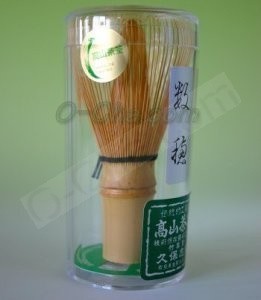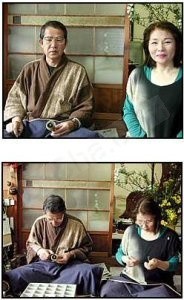- Handcrafted!
Matcha Tea Whisk
Consisting of 65-72 prongs, this whisk is handmade in Nara, Japan and should not be confused with imports from China that you will commonly encounter from most tea shops. There are over 120 different types of Nara tea whisks that vary according to the type of material used, shape and number of splines which will vary according to the school of tea, the kind of matcha (thick or regular thin type) which will be served, and various other factors. We chose this particular chasen for general purpose matcha drinking.
About our bamboo tea whisk suppler (view detailed images) - Our whisks are made by the Kubo family located near Nara Japan. You can see them in action on this well-made YouTube video making whisks here:
Differences between Japanese and Chinese tea whisks... The vast majority of tea whisks encountered on the market are copies made in China, not Japan. There is almost no market for matcha whisks within China itself, nearly all are exported abroad and surprisingly, even to Japan.
Japanese craftsmen start the whisk making process using a sharp knife to chip the end of the bamboo, giving it a clean sharp break, whereas in China it tends to be done with a file. Because of this, the tip of the whisk prongs of Japanese whisks are known to last longer.
The bamboo used in Japanese whisks is superior and is dried for well over a year before use, no fungicides are used when producing Nara tea whisks. A real Japanese whisk will cost 2 or 3 times more than a Chinese whisk, naturally. It certainly is possible to make matcha with a Chinese made whisk but for long term reliability, we recommend that you invest in the real deal.
Product questions
- Mar 12, 2016, 21:42
Hi, there,
Many places sell a 100-prong whisk, but you don't. It seems like 100 would be easier or faster. I'm sure there is a reason why you have chosen not to carry one. Could you explain? Thanks!Mar 12, 2016, 23:46There are over one hundred of types of whisks which we have available to us. We could easily buy 100 prong whisks but more prongs does not mean easier or faster. For example, we sell a whisk for koicha (thick) matcha which only has 48 prongs, this is appropriate for that matcha due to the thickness of koicha. The current whisk we sell with 65-72 prongs works perfectly for every type of matcha we sell, is made in Japan, and is of the highest quality. Most web sites which sell matcha are selling inferior Chinese made tea whisks that may look the same but will not last as long.
- ndsfNov 22, 2017, 02:47Seems like a great quality product. Happy and I will purchase one more when this one is worn.
- Jamie RavNov 14, 2017, 10:57Amazing! Really love the quality and the fact that it’s authentically handcrafted! This Chasen does a wonderful job whisking my matcha. Makes nice fine bubble ‘Froth’ . Just what I like for a smooth, creamy mouthful. I would recommend getting the ceramic whisk keeper. It’s great for keeping the shape of your whisk and helps with the drying .
- SOct 15, 2017, 06:04I'm glad I finally bought a chasen instead of using my electrical milk brother! This definitely gets me the best results :)
Remember not to store your whisk in the plastic container that it comes it, it will get mold! I bought a matcha whisk holder separately and definitely recommend investing in one. - Rocky PatanoMar 12, 2017, 12:50Much better than my previous Matcha whisk I bought from Amazon years ago. Makes the tea foam very nice and is very sturdy.
- Edward GallantJan 29, 2017, 09:18I bought this because if you use a metal whisk, you will scratch
up the bottom of your tea bowl. Using a bamboo whisk also means you will not make the unpleasant noise you get using a metal whisk
vigorously on a little tea bowl. For me that is reason enough. In
terms of taste, I don't find there is a real advantage to using bamboo
over metal. Remember to let your whisk air dry, or it will develop
mould (this happened to me 5 years ago when I first bought one and
thought it would be best to store it in the plastic container it came
in). I finally let myself buy another one :P - AndrewJan 8, 2017, 07:53I bought one of the Nara tea whisks for myself over two years ago, and just recently bought another as a gift. I have been extremely happy with the quality and durability of the whisk - simply rinsing under water and drying after each use has kept it in excellent condition. It rapidly produces a fine froth without much effort, and I wouldn't hesitate to buy another if my current required replacement.
- Patricia WeekleyJan 6, 2017, 19:58Authentic product - great quality!
- Nancy UngMay 19, 2016, 13:18At first, I thought that I could just use my regular metal whisk to mix the powder into the water. This seemed to work okay. but always left some powder residue at the bottom of the chawan. I decided to take the plunge and purchased this Japanese bamboo whisk and it DOES make a difference. No more residue and a smoother matcha. Sits nicely to dry on the holder and it helps to maintain its shape. A great purchase!
Related products
- Handcrafted!
- Handcrafted!
Die Kunden, die diesen Artikel gekauft haben, haben auch diesen erworben
- Popular!
- Shincha!
- Organic
- High Theanine!
- Popular!
- Rare!
- High Catechins!














